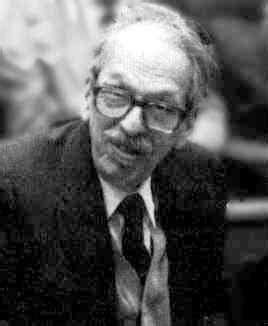A Quote by Margaret Atwood
I don't think of poetry as a 'rational' activity but as an aural one. My poems usually begin with words or phrases which appeal more because of their sound than their meaning, and the movement and phrasing of a poem are very important to me.
Related Quotes
The 'idea' for the poem, which may come as an image thrown against memory, as a sound of words that sets off a traveling of sound and meaning, as a curve of emotion (a form) plotted by certain crises of events or image or sound, or as a title which evokes a sense of inner relations; this is the first 'surfacing' of the poem. Then a period of stillness may follow.
The judges who awarded the 1980 Commonwealth Poetry Prize to my first collection of poems, Crossing the Peninsula and Other Poems, cited with approval and with no apparent conscious irony my early poem, "No Alarms." The poem was composed probably sometime in 1974 or 1975, and it complained about the impossibility of writing poetry - of being a poet - under the conditions in which I was living then.
I would read the Shel Silverstein poems, Dr. Seuss, and I noticed early on that poetry was something that just stuck in my head and I was replaying those rhymes and try to think of my own. In English, the only thing I wanted to do was poetry and all the other kids were like, "Oh, man. We have to write poems again?" and I would have a three-page long poem. I won a national poetry contest when I was in fourth grade for a poem called "Monster In My Closet.
[My poems] of course, it's symbolic, in the way that things in a poem can be - that is, pointing to something beyond its mere ordinary meaning, while also retaining all the qualities of that ordinary meaning. In other words, it's a bear, but it's also suggesting something else, just by virtue of the attention to it. But it's not "symbolic" in that way we are taught to think about things in poems.
Poetry of all the forms of literature I think is the most suited for the digital age and for the shorter attention spans and all of that. It Twitters very easily, some lyric poems and it's very easy to zip a poem to someone, so that's one of the things I think is wonderful about poetry in the digital age.
As for the differences between audio and the printed page, the sonic aspects of poetry are important to me. I read my poems aloud to myself as I'm composing them. And I enjoy reading to an audience. I think people get tone more easily when they hear a writer read her work. Some people have told me they hear more humor in my poems at a live reading than when they see them on the page. I think that may be a matter of pacing. On the other hand, I've listened to a lot of poetry readings and I know how much you can miss. If you stop to really register one line, you miss the next three or so.
Poems very seldom consist of poetry and nothing else; and pleasure can be derived also from their other ingredients. I am convinced that most readers, when they think they are admiring poetry, are deceived by inability to analyse their sensations, and that they are really admiring, not the poetry of the passage before them, but something else in it, which they like better than poetry.




































